Overview
Modern power grids are in a time of significant change. Growing renewable penetration, increasing use of electric vehicles, and other changes are increasing the stochasticity of power supply and demand, bringing new challenges for power system operators. Currently, power grid operators manage the uncertainty and risk in day-to-day operation by (i) forecasting the mean behavior of the power system stochastic variables (load demand, wind/solar generation); (ii) employing deterministic optimization (DO) algorithms for making short-term generator scheduling decisions; (iii) setting conservative reserve requirements in the DO problem; and (iv) leveraging operator experience to make ad-hoc changes in the generator schedule obtained using DO. This currently practiced risk management framework does not explicitly quantify system risk and does not explicitly consider the uncertainty in the stochastic power grid variables. Such an approach is challenged by increasing stochasticity in power supply and demand.
Stochastic optimization (SO) methods provide a viable alternative for managing the risk in the power grids with increasing stochasticity. However, these methods have not been adopted by operators due to the lack of trust, unavailability of rigorously validated probabilistic forecasts, and high computational cost of executing these algorithms. Our work seeks to bridge these gaps by (i) developing methods to quantify the risk associated with a given decision in a clear and efficient manner to build trust in new optimization tools; (ii) developing and rigorously validating probabilistic forecasting models that learn the joint distribution of the stochastic variables; and (iii) exploring dimension reduction approaches to ease the computational burden of SO.
Current Research
- Probabilistic forecasting, and forecast model validation
- Short-term (i.e., intra-day) risk and reliability assessment
- Real-time risk assessment using machine learning surrogates for operational optimization algorithms
- Global sensitivity analysis and dimension reduction for stochastic unit commitment
Forecasting power supply and demand for power grid operation (Case Study: French RTE Power Grid)
- Developed machine learning models to jointly predict power demand (load) and supply (solar/wind generation from multiple solar/wind farms)
- Captured the correlations between quantities of interest in the forecasting models, to accurately inform stochastic decision-making (optimization) algorithms
- Compared the performance of sequence-to-sequence (e.g., long short-term memory networks, LSTM) and recursive one step-ahead (e.g., periodic vector autoregression, PVAR) models.
- Developed a dimension reduction-based forecasting methodology that uses principal component analysis (PCA) and periodic regression (PR) in the reduced space.
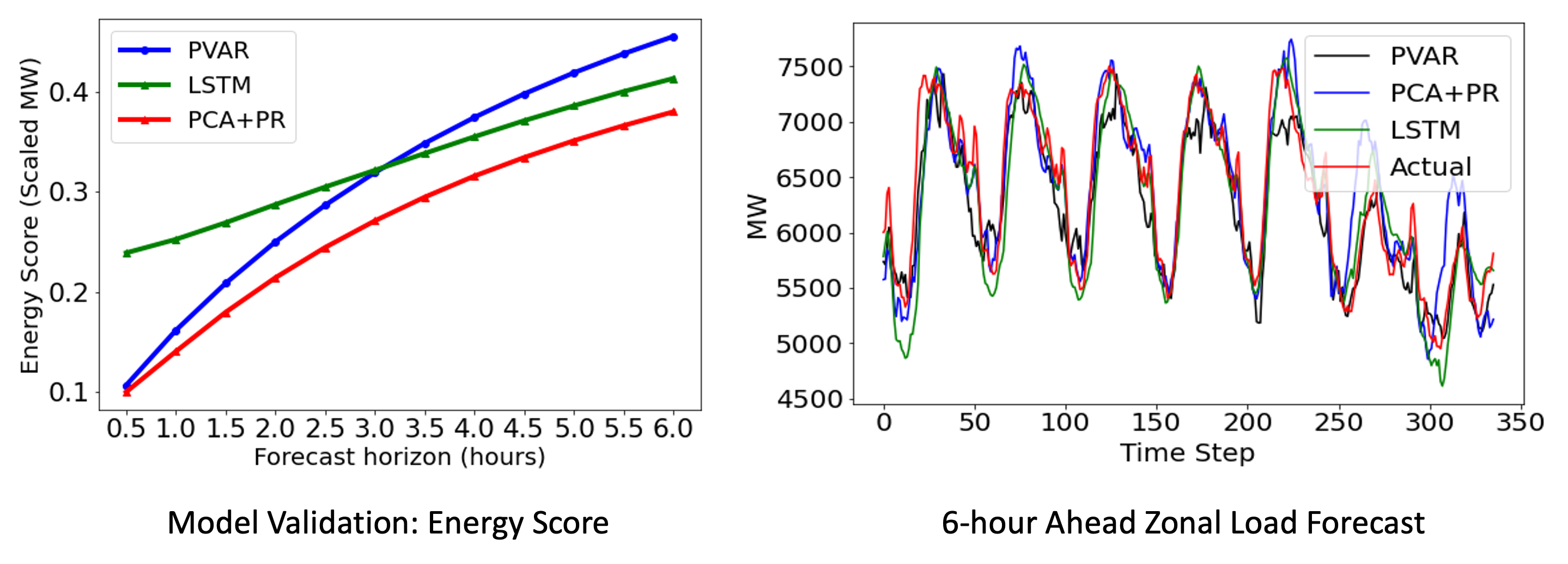
Risk and Reliability assessment framework

Overview of reliability/risk assessment framework
Explicit risk assessment can quantify the risk associated with a generator scheduling decision in a transparent manner. This can help operators build trust in new stochastic optimization tools, by confirming that the new algorithms do reduce the risk compared to the currently used deterministic optimization algorithms. It can also support risk-versus-cost decision making and assist grid operators to maintain safe operation in new operating regimes. In this risk assessment framework, we use probabilistic forecasts to perform risk assessment with respect to:
- Generating cost
- Supply and reserve adequacy
- Supply and reserve flexibility
- Voltage stability and grid resilience
We define risk metrics at three levels to support clear communication with grid operators:
- Conditional expectation in the worst α% of cases (similar to the CVaR approach in financial risk management)
- Probability of adverse events --> reliability analysis
- Probability and consequence of adverse events --> risk assessment
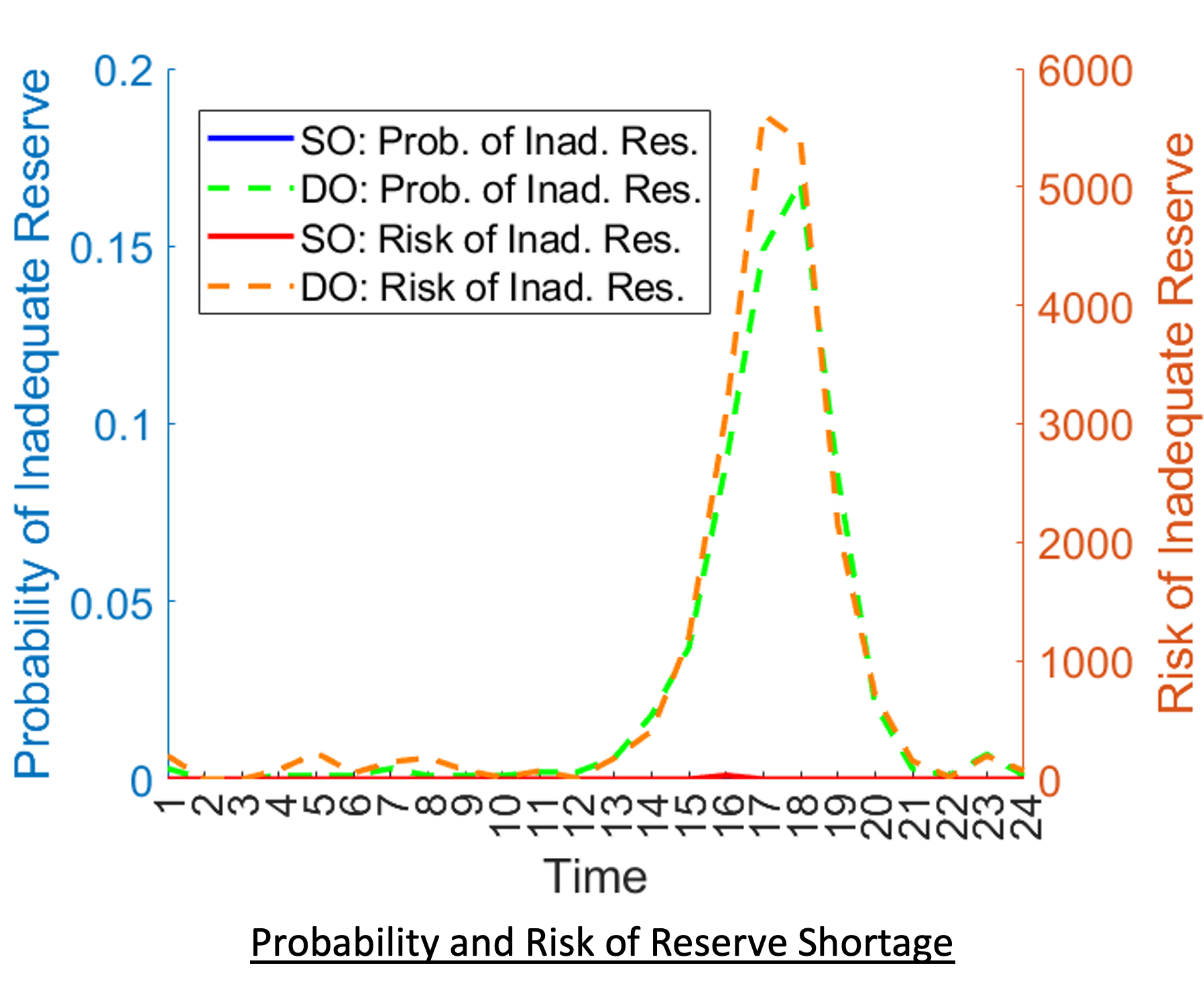
Using our approach, we can also assess the N-1 security of a proposed UC/ED portfolio. Our approach assesses:
- Can the system withstand a generator failure (known as a contingency)?
- What is the probability of an adverse event (system collapse, voltage instability, under-frequency load shedding, or transmission line limit exceedance) following each generator failure?
- Which generator failures would most significantly adversely impact the system?
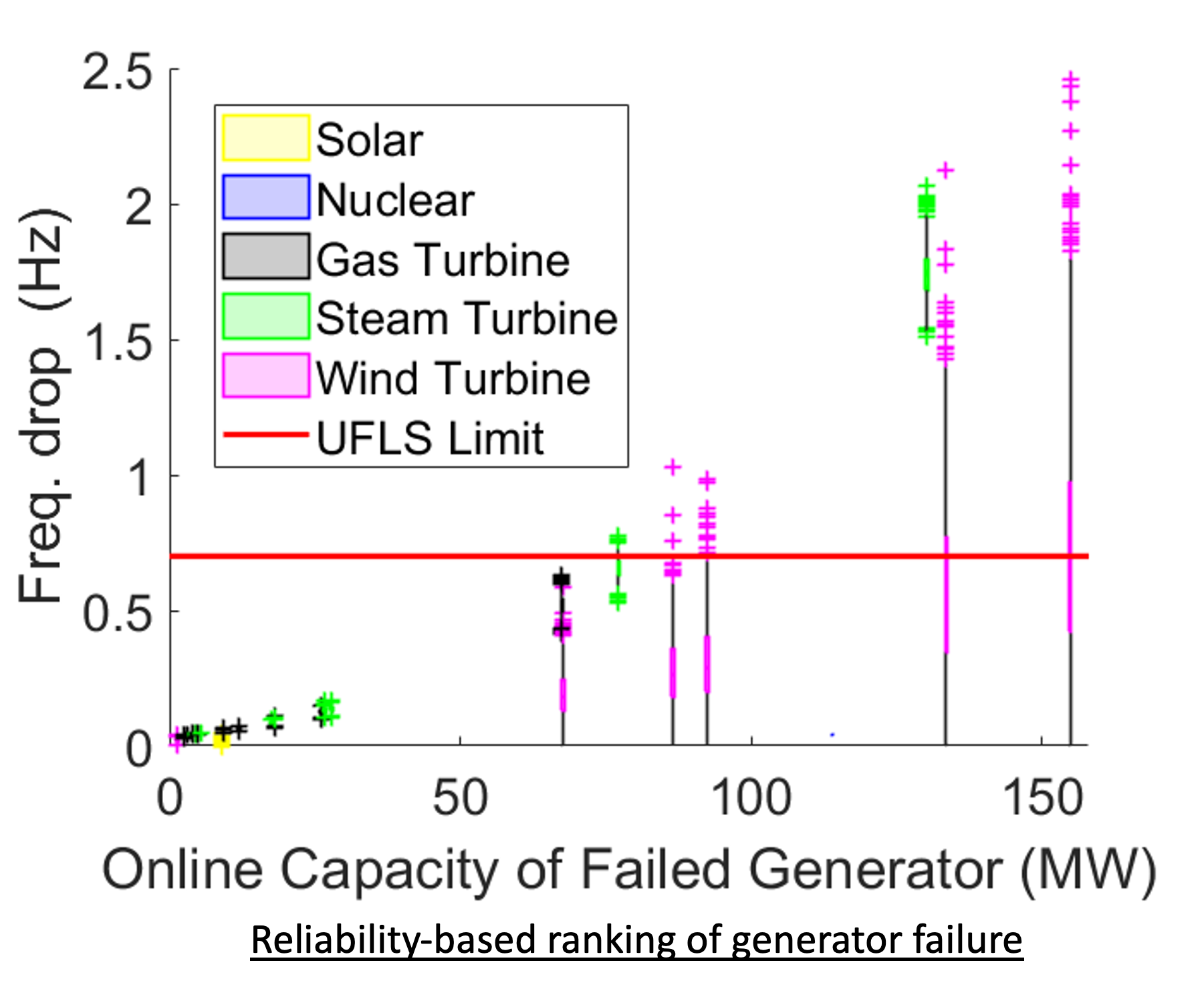
Stochastic sensitivity analysis and dimension reduction for stochastic unit commitment
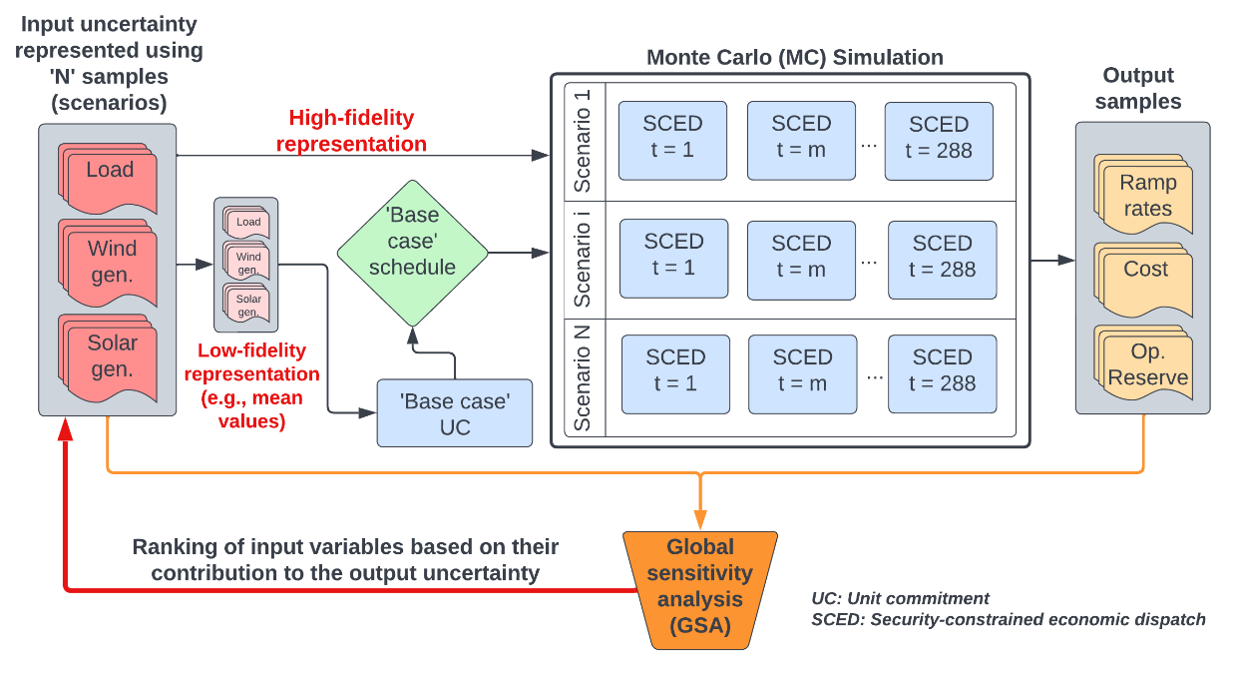
Stochastic sensitivity analysis of unit commitment
- Quantify the sensitivity of quantities of interest (cost, reserves, load shed) to the uncertainty in stochastic inputs (solar/wind generation, load)
- Rank stochastic input variables based on their contribution to the output uncertainty
- Treat unimportant stochastic input variables as deterministic variables in the stochastic optimization algorithms --> reduce the dimension of the stochastic input vector
- Quantify and compare system risk corresponding to decisions made by considering all inputs as stochastic variables and by considering only the important inputs as stochastic variables
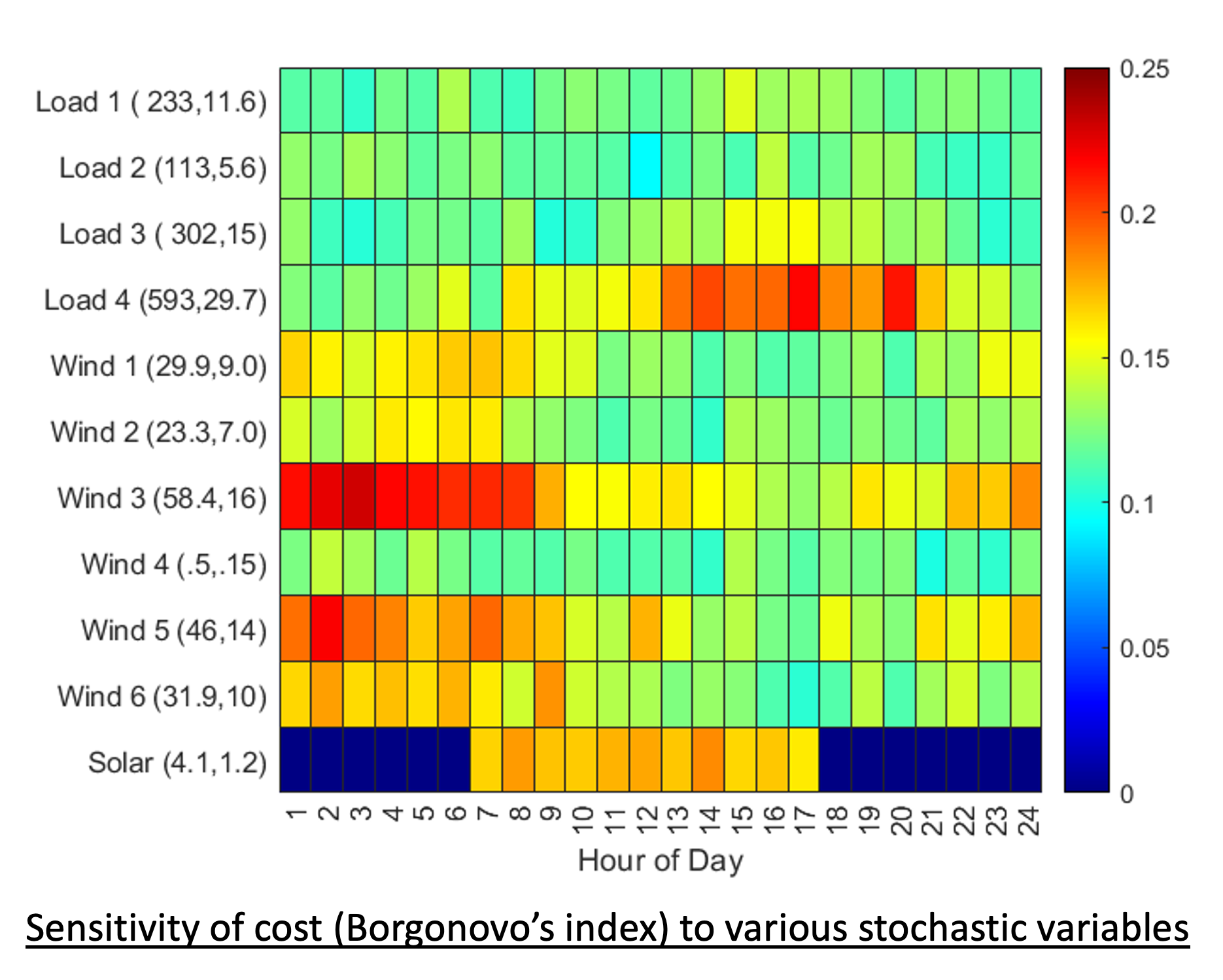
Funding

Current People
- Sankaran Mahadevan, Professor
- Hiba Baroud, Associate Professor
- Pranav Karve, Research Associate Professor
- Oliver Stover, Ph.D. Student
- Yadong Zhang, Ph.D. Student
Past Members
- Paromita Nath, Postdoctoral Fellow
Publications
Stover, Oliver, et al. "Dependence structure learning and joint probabilistic forecasting of stochastic power grid variables." Applied Energy 357 (2024): 122438.
Stover, Oliver, Pranav Karve, and Sankaran Mahadevan. "Global Sensitivity Analysis-Based Dimension Reduction for Stochastic Unit Commitment." IEEE Transactions on Power Systems (2023).
Stover, O., Karve, P., & Mahadevan, S. (2022). Reliability and risk metrics to assess operational adequacy and flexibility of power grids. Reliability Engineering & System Safety, 109018.
